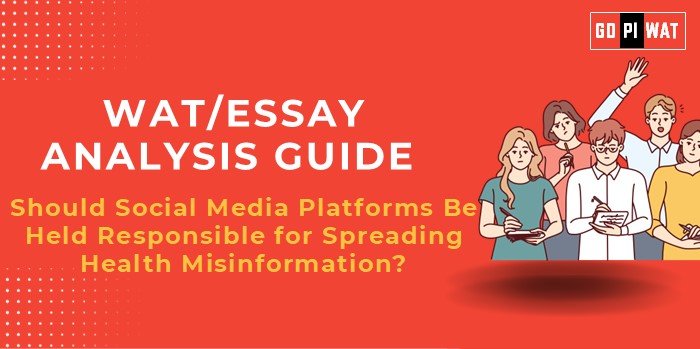📋 WAT/Essay Analysis Guide: Should Social Media Platforms Be Held Responsible for Spreading Health Misinformation?
🌐 Understanding the Topic’s Importance
This essay addresses the ethical and regulatory dilemma of holding platforms accountable for misinformation. Its relevance spans public health, governance, and technology domains, making it a critical theme for B-school assessments.
📝 Effective Planning and Writing
- Time Allocation:
- 🕔 Planning: 5 minutes
- ✍️ Writing: 20 minutes
- 🔍 Review: 5 minutes
- Preparation Tips:
- Research global case studies.
- Identify 2-3 examples of misinformation’s impact.
🔑 Introduction Techniques
- Template 1: Problem-Statement Approach
- Template 2: Contrast-Based Introduction
“Social media’s unprecedented influence has turned it into both an information goldmine and a breeding ground for misinformation. With health at stake, the debate on platform accountability has reached a critical juncture.”
“While platforms connect billions, their inability to curb harmful misinformation poses grave risks, as evidenced during the COVID-19 pandemic.”
📚 Structuring the Essay Body
- Paragraph 1: Achievements
- Paragraph 2: Challenges
- Paragraph 3: Future Outlook
Highlight platforms’ proactive efforts: partnerships with health organizations, AI for content moderation, and awareness campaigns.
Discuss regulation gaps, algorithmic biases, and global inconsistencies. Include Germany’s success and the US’s Section 230 controversy.
Propose collaborative regulation models, better AI tools, and international agreements on health misinformation policies.
✔️ Concluding Effectively
- Balanced Conclusion:
- Forward-Looking Conclusion:
“Holding social media accountable is necessary but insufficient alone. Collaborative global regulations and user education are vital to curbing health misinformation sustainably.”
“Striking a balance between platform accountability and free speech is key to a healthier, better-informed world.”
💡 Sample Short Essays
- Balanced Perspective:
- Solution-Oriented:
- Global Comparison:
“Social media platforms connect billions but also amplify health misinformation. Accountability frameworks combined with public education offer a sustainable solution.”
“AI, robust regulation, and international collaboration can empower platforms to combat health misinformation without compromising free speech.”
“While Germany’s NetzDG law shows promise, adapting it for a global scale could provide a unified approach to tackling health misinformation.”


